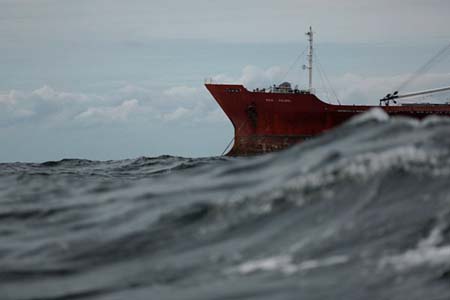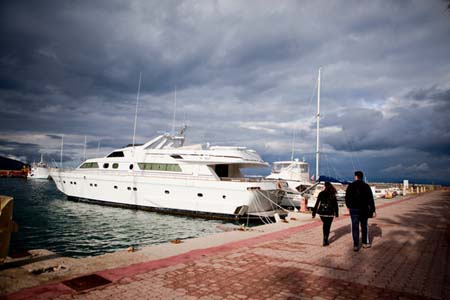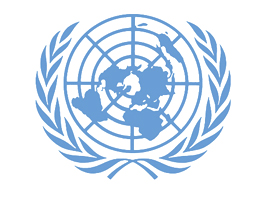|

Few places on Earth are as free from legal oversight as the high seas. One ship has been among the most persistent offenders.
CHIOS, Greece — The rickety raft made of empty oil drums and a wooden tabletop rolled and pitched with the waves while tied to the side of the Dona Liberta, a 370-foot cargo ship anchored far from land in the Atlantic Ocean off West Africa.
“Go down!” yelled a knife-wielding crew member, forcing two Tanzanian stowaways overboard and onto the raft. As angry clouds gathered on the horizon, he cut the line.
Gambling on a better life, the stowaways had run out of luck. They had already spent nine days at sea, most of the time hiding in the Dona Liberta’s engine room, crouched deep in oily water. But as they climbed down onto the slick raft, the men, neither of whom knew how to swim, nearly slid into the ocean before lashing themselves together to the raft with a rope.
As the Dona Liberta slowly disappeared, David George Mndolwa, one of the abandoned pair, recalled
thinking: “This is the end.”
Few places on the planet are as lawless as the high seas, where egregious crimes are routinely committed with impunity. Though the global economy is ever more dependent on a fleet of more than four million fishing and small cargo vessels and 100,000 large merchant ships that haul about 90 percent of the world’s goods, today’s maritime laws have hardly more teeth than they did centuries ago when history’s great empires first explored the oceans’ farthest reaches.
Murders regularly occur offshore — thousands of seafarers, fishermen or sea migrants die under suspicious circumstances annually, maritime officials say — but culprits are rarely held accountable. No one is required to report violent crimes committed in international waters.
Through debt or coercion, tens of thousands of workers, many of them children, are enslaved on boats every year, with only occasional interventions. On average, a large ship sinks every four days and between
2,000 and 6,000 seamen die annually, typically because of avoidable accidents linked to lax safety practices.
Ships intentionally dump more engine oil and sludge into the oceans in the span of three years than that spilled in the Deepwater Horizon and Exxon Valdez accidents combined, ocean researchers say, and emit huge amounts of certain air pollutants, far more than all the world’s cars. Commercial fishing, much of it illegal, has so efficiently plundered marine stocks that the world’s population of predatory fish has declined by two thirds.
The Dona Liberta has been among the most persistent of scofflaws, offering a case study of misconduct at
sea, according to an examination of shipping, insurance and port records, and dozens of interviews with law
enforcement, maritime experts and former company associates. The vessel not only cast off stowaways —
Jocktan Francis Kobelo, the second man ordered onto the raft, died from the 2011 ordeal — but has also
been accused of a long list of other offenses over the past decade.
As the rusty refrigerator ship moved across two oceans and five seas and among 20 ports, it routinely abused, cheated and abandoned its crew, caused an oil slick nearly 100 miles long, and drew citations from a half-dozen countries for other environmental violations. Creditors chased its owner for millions of dollars in unpaid debts, and maritime watchdog groups listed its parent company as an illegal fishing suspect. Still, the ship operated freely and never lacked for work or laborers.
“In the maritime world, it’s far easier for countries to look the other way with problem ships like the Dona
Liberta than to do something about them,” said Mark Young, a retired United States Coast Guard commander and former chief of enforcement for the Pacific Ocean.
Vessels that disappear over the horizon tend to vanish not just from sight but from oversight, a New York Times investigation found. Countries have signed dozens of maritime pacts, the shipping industry has published reams of guidelines and the United Nations maritime agency has written hundreds of rules, all aimed at regulating ships, crews and safety. But those laws are also often weak, contradictory and easily skirted by criminals. National and international agencies usually have neither the inclination nor resources to enforce them.
The modern flagging system, which allows ships to buy the right to fly the flag of a country as long as it
promises to follow its laws, provides good cover for the unscrupulous.
Usually, a ship may be stopped on the high seas only by a law enforcement or military vessel flying the
same flag. The world’s navies, though, have been scaling down for decades. Most nations, including the
Bahamas, whose flag the Dona Liberta flew, have no ships that regularly patrol beyond their national waters.
(Some landlocked countries like Mongolia and Bolivia offer flags for cheaper costs.)
When wrongdoing occurs, no single agency within a country or specific international organization typically has
a sufficient stake in the matter to pursue it. The stowaways on the Dona Liberta, for example, were undocumented immigrants from Tanzania, living in South Africa and brought to shore in Liberia. The ship was
owned by a Greek company incorporated in Liberia, crewed primarily by Filipinos, captained by an Italian,
flagged to the Bahamas and passing through international waters. “Who leads such an investigation?” Mr. Young asked.
There is much at stake: A melting Arctic has expanded trade routes. Evolving technology has opened the deep
seabed to new mining and drilling. Maritime rivalry and piracy have led to more violent clashes. And, with an
ever more borderless economy, sea commerce is vital to many countries. “Without ships, half of the world would
freeze and the other half would starve,” Rose George, a British nautical writer, said.
In recent months, the United States has said that it intends to take a bigger role in high seas governance.
“We ignore the oceans at our peril,” said Secretary of State John Kerry, who has pushed for more marine
conservation globally and in May brokered a landmark deal with Russia to regulate trawling in Arctic waters.
Mr. Young pressed for urgent action. Asked to describe the world’s oceans today, he said: “Like the Wild West.
Weak rules, few sheriffs, lots of outlaws.”

“The guy is smoke,” said Lefteris Kormalos, a ship engine parts dealer. Last year, Mr. Kormalos won a court decision for $30,000 in unpaid debts from Mr. Kallimasias, who is named in at least 15 similar lawsuits in Greek or American courts. Legal documents variously describe him as owner, consultant or managing director of Commercial S.A., another business called Fairport Shipping and the Dona Liberta.
Built in Japan in 1991, the Dona Liberta was operated or owned by several British and Japanese companies before Commercial S.A. acquired it in 2004. It had variously been named the Emerald Reefer, the Sanwa Hope and the Sun An. Over the years it has flown the flags of Panama, the Bahamas and Kiribati, a tiny island nation in the Central Pacific.
A slow, powerful workhorse, the steel-hulled vessel has more than 20,000 cubic feet of refrigeration space,enough to carry the equivalent of more than 25 million cans of tuna, the Dona Liberta’s main cargo.
Known more commonly as “reefers,” this type of refrigeration ship is a dying breed that has been squeezed out of the business of transporting fruits and vegetables by container ships that are more than three times their size and have superior temperature-control technology. To survive, many reefers have shifted in recent years to moving fish, much of it illegal, and other contraband like counterfeit cigarettes and drugs, according to maritime insurance officials.
Mr. Kallimasias did not respond to interview requests. A clerk at the office of Commercial S.A. and Fairport Shipping in Athens shouted at a reporter through a front-gate intercom that it was inappropriate to have visited there, a point reiterated later in an email from Fairport’s lawyer, Alexandros Papalamprou.
In the 1980s, when one of Mr. Kallimasias’s companies failed to repay a loan of more than $11 million to the National Bank of Greece, members of the Greek Parliament investigated. They found one ship of his worth seizing, but it caught fire at sea and sank, in what was believed to be a deliberate act to collect insurance on it, according to legal documents provided to The Times by a Parliament member.
Dinos Anargyrou, a former Kallimasias supplier and litigant, recounted how the courts were unable to seize Mr. Kallimasias’ assets in 2013 for another unpaid debt. At the last minute, his company moved its corporate address from a two-story luxury building in an upscale section of Athens to a 100-square-foot vacant apartment in an aging downtown high-rise.
Scrounging for Food
In whispered phone calls or surreptitious notes, crew members from the Dona Liberta regularly contacted the international seafarers’ union, pleading for help. They described safety violations, harsh conditions, wage theft and abandonment, union records show.
By 2012, the mistreatment led the union to warn mariners against working for the Dona Liberta and other ships owned by Commercial S.A., according to union officials based in London.
“Lack of winter jackets, hard hats and safety shoes,” one union inspector wrote, describing crew members working outside in Norway in November. In Spain and South Africa, the crew complained that the captain routinely doctored the log books to show wages that were never paid and ship repairs that never occurred.
“When your contract is over, they send you home, saying they’ve transferred the money,” Yuriy Cheng, a Ukrainian, wrote in an undated post in Russian on a mariners’ online forum about the Dona Liberta’s owner. “You get home, and there is nothing there.”
Mr. Cheng described a standoff on his ship between management and the mostly Filipino crew members, who stopped work after a year of not being paid despite threats that they would be jailed if they failed to deliver the cargo. “These guys are 40 or 50 years old,” he wrote, “and they were crying like babies out of frustration.”
In June 2011, George Cristof, a veteran sailor, knew something was wrong from the moment he stepped on board the Dona Liberta in the Port of Truro, England. Hired by a maritime employment agency in Galati, Romania, he had been instructed in a brief call with Mr. Kallimasias’s shipping company to fly immediately to England because a full crew was waiting, ready to launch.
But when he arrived, Mr. Cristof found the situation far different, he recalled in an interview. The provisions were gone, the cargo hold empty, the crew departed. The Dona Liberta had barely enough fuel to power the wheel room’s overhead lamp, much less run the ship’s 5,600-horsepower engine.
Mr. Cristof was soon joined by another Romanian, Florin Raducan, and for the next several months the two men survived by fishing over the side and begging for canned goods and bottled water from passing ships. Some days they did not eat. They lacked the money and documents needed to disembark and return home. Their phone cards were drained, their cigarettes were all but gone. The men had no heat, running water, functioning toilets or electricity. They collected rainwater to clean themselves.
“It wasn’t enough,” Mr. Cristof recounted. He soon developed a severe fungal infection on his chest, his medical records show.
Each day the men waited for orders that never came. “Jail with a salary,” Mr. Cristof said, reciting a common expression about work at sea. “Except the salary isn’t guaranteed.”
More than 2,300 seafarers have been similarly stranded by their employers over the last decade, United Nations data shows. A ship’s cargo is often better protected than its crew. The industry only recently imposed rules, taking effect in 2017, mandating that shipowners carry insurance or show other proof that they can cover the costs of sailors marooned in port, as well as seafarers’ death and long-term disability entitlements.
In England, an aid organization came to the rescue of the two Romanians. “They did not want to stay but they refused to leave,” Ben Bailey, project manager of the group, Mission to Seafarers, said of the men’s predicament. Each sailor had paid more than $1,000 to the employment agency to get the job on the Dona Liberta, he said. Abandoning the ship forfeited any chance of recouping that money or collecting the wages promised to them.
After five months, though, Mr. Cristof and Mr. Raducan gave up. They flew back to Romania. For Mr. Cristof, the breaking point had come when he learned his children could no longer afford school. For Mr. Raducan: finding out that his wife had resorted to begging in public.
Maritime Merry-Go-Round
Few crimes are tougher to investigate than those that occur at sea. There are no cameras on the corner, no phones to tap, usually no weapons to retrieve. Crew members are often changed mid-voyage, so witnesses are scarce. “The crime scene is moving,” explained Mr. Young, the former Coast Guard official who is now senior officer of conservation enforcement at the Pew Charitable Trusts.
Complicating matters is what industry officials call the “maritime merry-go-round.” Asked about investigating the Dona Liberta’s possible crimes on the high seas, a United States Coast Guard official said it was not its jurisdiction. “Try Interpol,” he suggested. The authorities there said that its role was mostly to pass information between countries.
Officials at the International Maritime Organization, a United Nations agency, said that the country whose flag the vessel flies is supposed to investigate any allegations. An official at the Bahamas flag registry program said that any inquiry by his office would be referred to the I.M.O.
Early one morning in April 2012, the three-person staff at SkyTruth, an environmental watchdog group based in West Virginia, huddled over satellite footage sent from the European Space Agency. Their attention was quickly drawn to a half-dozen black slashes — what looked to them like intentional dumping from ships — in waters off the coast of Africa.
The longest gash in the ocean imagery stretched about 92 miles from Cabinda, Angola. On the leading edge of the slick, the Dona Liberta was headed northwest.
Ships have several options for handling the large amount of oily wastewater and fuel sludge that their engines produce during voyages. They can incinerate it on board, pay to unload it at a waste depot or — cheapest of all — use a “magic pipe,” a jury-rigged hose that illegally pumps the waste directly overboard or underwater.
That episode of dumping was not an isolated event. In February 2012, British environmental authorities had to clean up a slick caused by the Dona Liberta in the River Fal. Eight months before that, the ship was cited by Russian inspectors for having doctored its oil logbooks, a telltale sign of illegal dumping at sea. The Dona Liberta was cited for the same offense by Spanish inspectors in July 2009, Dutch inspectors
in 2005, and British inspectors in 2004.
Most of these citations did not result in fines, most likely because few countries beyond the United States and Britain consistently prosecute such violations.
This time, no investigation was even opened. When other environmental groups alerted United Nations maritime officials, Interpol and the United States Coast Guard about the oil slick, officials said they had no jurisdiction. “Of the few people watching, even fewer do anything to stop it,” said John Hocevar, the oceans director at Greenpeace.
A New Name
For much of last year, the Dona Liberta disappeared after turning off its location transponder. Though illegal under most conditions for large ships, disconnecting the device is easy and especially common on vessels carrying contraband.
Then in November, the rusty reefer reappeared in the Gulf of Thailand. When approached by a reporter eight miles off the coast, the Chinese captain explained that his ship had a new owner — a Chinese company — and a new flag — Kiribati. The ship’s new name, Sea Pearl, was painted on its forward hull, alongside a shadow of its old one. (The ship has since changed its flag, again, to Vanuatu.)
Asked about the ship’s past misdeeds, the captain demurred. “Different company, different company,” he said.
|






